Note: On January 1, 2024, the Republic of Artsakh was officially dissolved per the decree signed by Artsakh President Samvel Shahramanyan on September 28, 2023, following Azerbaijan’s full throttle military assault that resulted in the fall of Artsakh and the ethnic cleansing of its Armenian population. According to the decree, all Artsakh state institutions have been dissolved, and the republic has ceased to exist. Siranush Sargsyan’s report highlights the ongoing humanitarian crisis arising from the genocide carried out by Azerbaijan against Artsakh and the profound needs of the forcibly displaced Armenians of Artsakh.
One year ago, the depopulation of Artsakh began with a blockade imposed by Azerbaijan on December 13, 2022. It was completed on September 19, 2023, when Azerbaijan launched a military assault on Artsakh to seize the territory and forcibly displace its population. In the past year, the people of Artsakh have endured a nine-month siege, a two-day war, forced displacement and the loss of their homeland. Now 100,000 Armenians from Artsakh are living as refugees in Armenia.
The stories of displaced families are all unique, yet they share a common harsh reality. Families grapple with a spectrum of challenges—social, psychological, economic and cultural—and carry stories of survival and strength amid the uncertainties of their circumstances far away from their homes. Armenian municipalities, diaspora Armenians and international organizations have been working together to address the immediate needs of the displaced, including food, hygiene and household items. But the problems are diverse and difficult, especially the issues of finding affordable apartments for rent, providing necessary household appliances and furniture and securing employment.
Lilit Sargsyan, a single mother from Askeran, Artsakh, with her six-year-old daughter and parents now call Khachpar village in the Masis municipality of Armenia their home. Unable to afford rent, Sargsyan, with the help of friends, acquired a makeshift cabin, or a domik. Her father is working hard to renovate the cabin, hoping to shield the family from the winter cold. Her grandmother’s old carpet, the most precious thing she brought with her from Artsakh, makes the home a bit warmer.
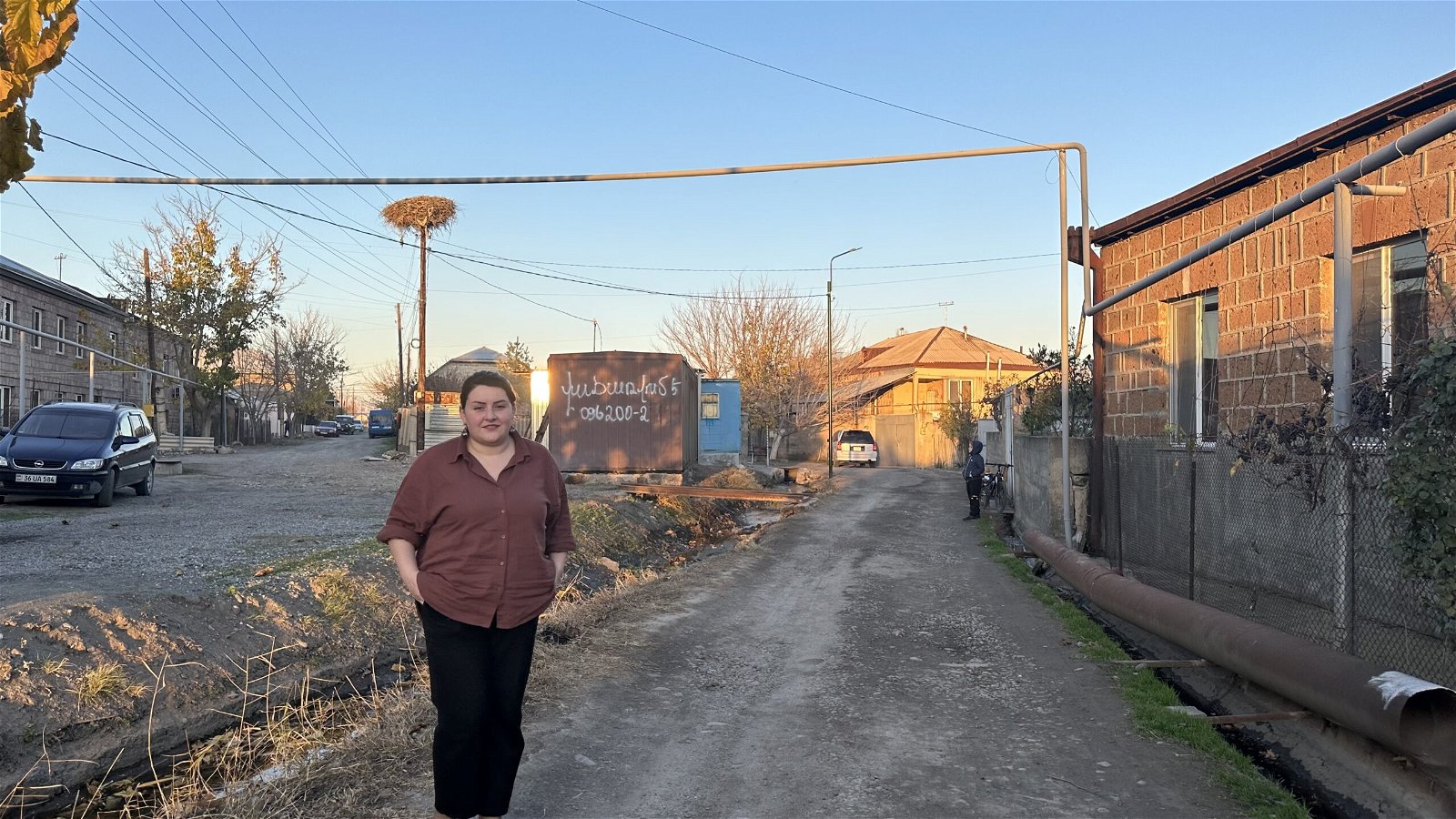
Currently teaching at Khachpar Secondary School, Sargsyan regards her teaching years in Artsakh as the most meaningful and cherished period of her life.
Sargsyan has experienced four wars in her lifetime. She says the most challenging was the recent two-day war in September. Facing a military attack after nine months of blockade, the family had no access to hiding places, food or transportation. Organizing care for her disabled daughter during the siege was especially tough. She could not take her daughter to the rehabilitation center twice a week like she used to due to the lack of fuel. She did not know how to explain the daily struggle for food to her daughter.
“Everyday after 6 o’clock was the hardest moment for me. Although I missed my daughter during the day, I didn’t want to go home, because I had nothing to give her,” Sargsyan said. “When there was nothing, she ate spaghetti, which until the blockade I used to cook a lot for her with oil and salt. But I couldn’t buy it. Then a friend of mine gave me three kilograms of real white flour, which was a miracle for me at that time. I tried to make spaghetti with salt, water and flour, and it worked. She loved eating it. There was no oil, so I added lard, but she didn’t understand and ate it with pleasure.”
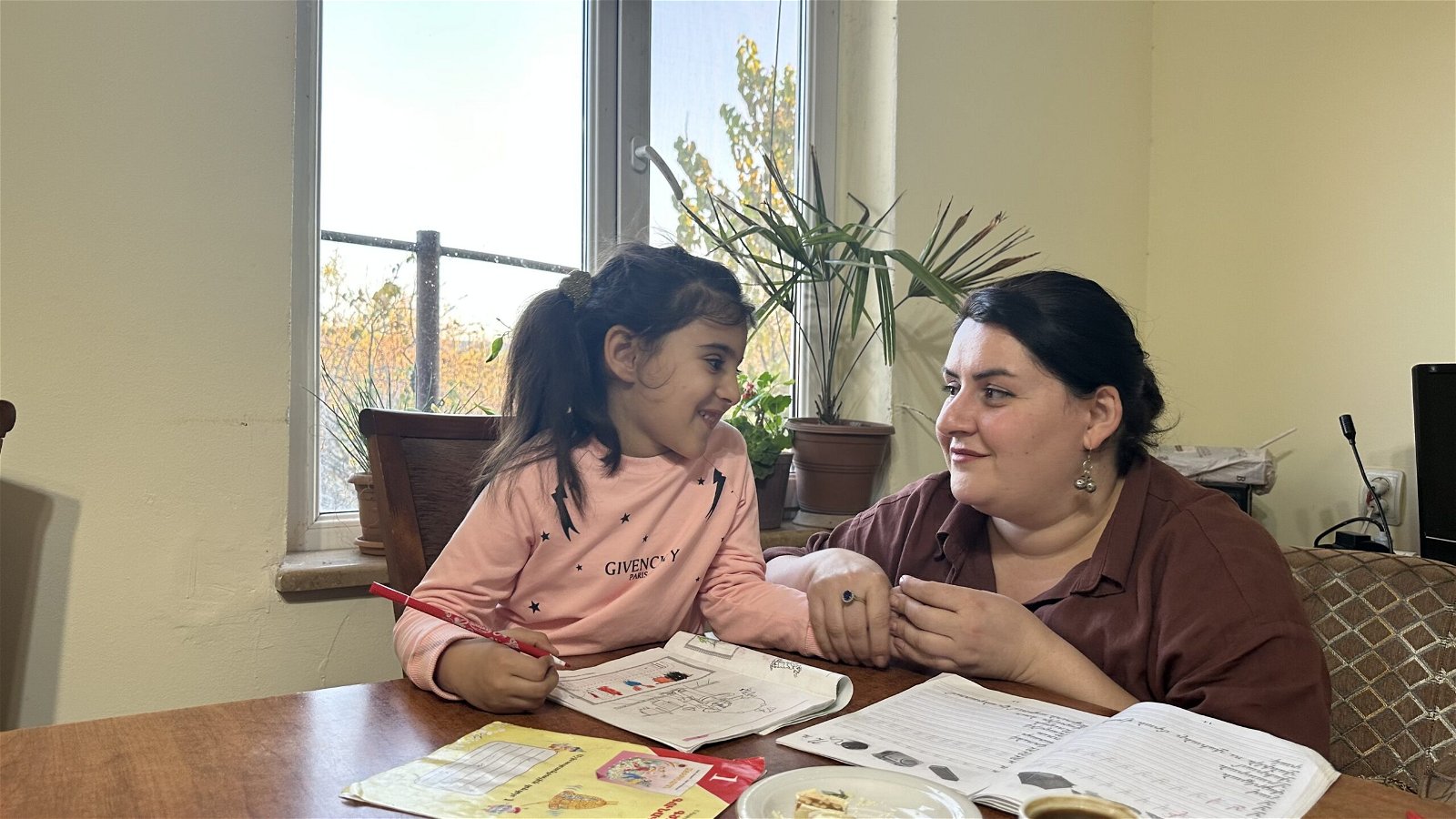
In Khachpar, Sargsyan’s family found a warm welcome. “Perhaps it’s because many here are refugees from Azerbaijan due to the 1990s Artsakh War and those who settled after the 2020 war. They understand us better,” she reflected. However, challenges persist. The Armenian government has issued a temporary protection status to forcibly displaced people from Artsakh. Like most families, Sargsyan is still waiting to receive documents confirming their status and cannot access child benefits, while her parents cannot receive their pension.
“We just don’t feel safe living with Azerbaijanis. Talking about security is absurd, especially if we aren’t going to have an army or any other way to defend ourselves.”
According to the decision adopted by the Armenian government, people forcibly displaced from Artsakh have been granted the status of temporary protection, rather than citizenship or refugee status. Only after receiving a document confirming this status along with temporary registration can forcibly displaced people receive their pensions or child benefits.
Tens of thousands of forcibly displaced people are still waiting to receive the document confirming their temporary protection status and have not received their pensions for three months. They are also unable to benefit from a number of state subsidy programs and benefits due to the lack of timely registration.
While residing in Artsakh, residents had used passports of the Republic of Armenia. It is insulting and incomprehensible to Sargsyan, and many other displaced people from Artsakh, why she should now choose between giving up her passport in exchange for another one or being considered a refugee in her own homeland.
Sargsyan yearns to return to Artsakh yet struggles to envision coexistence with Azerbaijanis. “We just don’t feel safe living with Azerbaijanis. Talking about security is absurd, especially if we aren’t going to have an army or any other way to defend ourselves,” she said. Asked what she would bring with her from Artsakh to Armenia if given the chance, she said, “Perhaps our pineapple and pomegranate crops have turned into bird feed or rotted.” She would bring saplings from those trees and open the window of their house to prevent mold.
“We just don’t feel safe living with Azerbaijanis”, says Lilit Sargsyan, a singe mother forcibly displaced from #NagornoKarabakh #Artsakh pic.twitter.com/YWf3qXQHO3
— Siranush Sargsyan (@SiranushSargsy1) December 7, 2023
According to the deputy mayor of Masis, Khoren Aroyan, in the first days of the mass displacement, about 12,000 people from Artsakh settled in the town of Masis and neighboring villages. Some of them have since moved to other regions of Armenia, and about 8,500 displaced people remain.
After the Baku and Sumgait pogroms against Armenians during the first Artsakh War, many people with roots in Artsakh fled to Masis. After the 2020 war, many people from Artsakh once again sought refuge in Masis among their relatives and friends.
Sarushen is one of many villages in Artsakh that was fired on by Azerbaijani forces throughout the blockade, restricting agricultural work and garden cultivation. When the war started on September 19, Ivan Harutyunyan from Sarushen could only save his family members, leaving behind everything else he cherished.
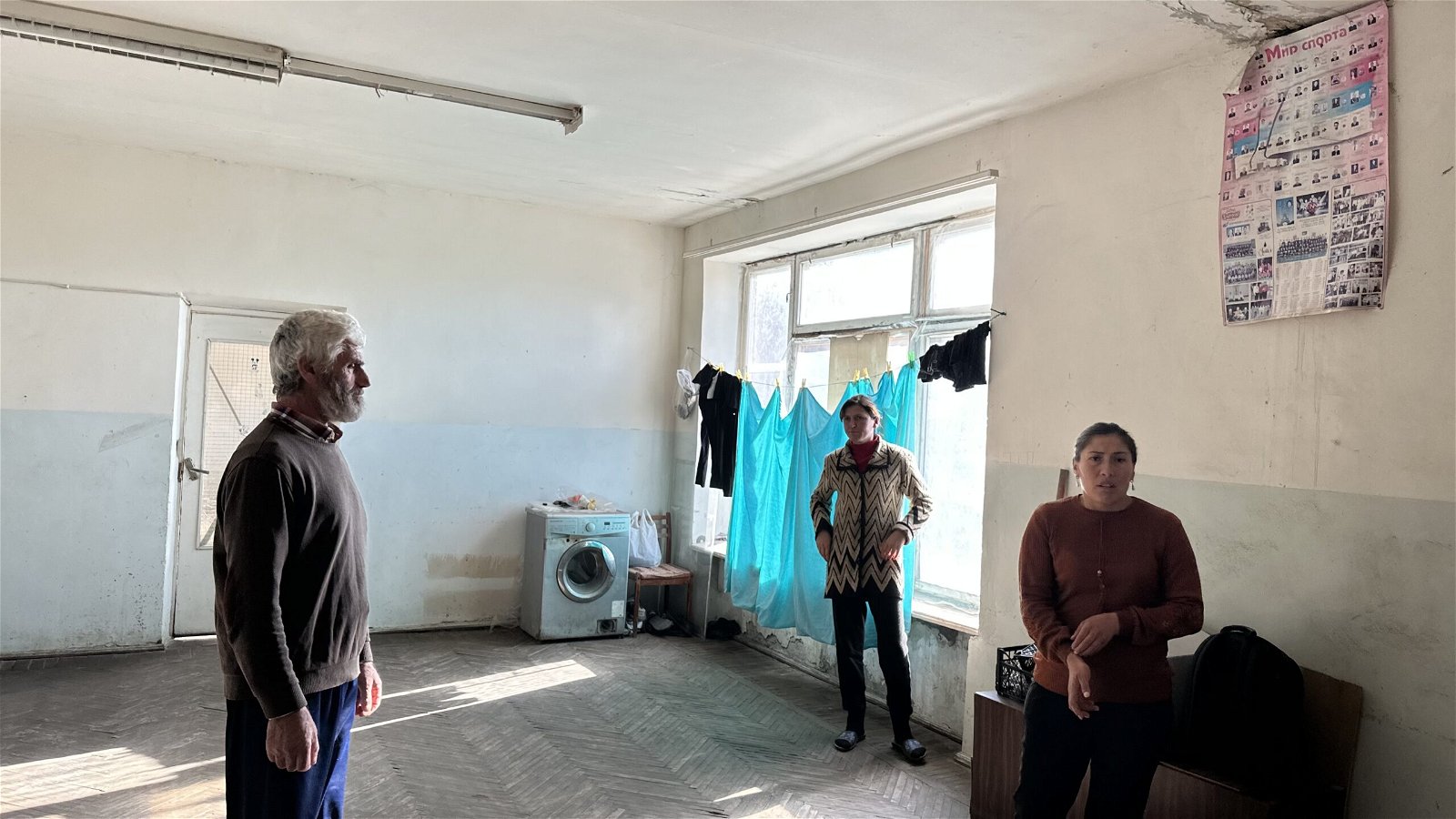
“We left our lands, our livestock and our ancestors’ graves,” Harutyunyan said with a heavy heart. “We had no choice but to abandon everything and escape through the forests.” His journey of forced displacement from the Artsakh capital Stepanakert, lasting almost three days, led him to the town of Goris in southern Armenia and then to Masis.
“I regret losing the four tractors I used not only for our gardens and arable lands but also for the entire village. We can rebuild houses, but how do we work without equipment?” Harutyunyan said.
Today, he shares a room in a former, dilapidated library building with several families, including those of his three brothers, totaling 31 people. Despite efforts by the municipal administration to provide beds and essentials, living conditions are challenging. Families share a single toilet-bathroom, and there is no kitchen. The struggle for normalcy persists, a common thread in the lives of the displaced.
Alina Harutyunyan, a mother of four children, was displaced from the village of Harutyunagomer in the Martakert region of Artsakh. Her family was involved in pig breeding, poultry farming and cultivating buckwheat. When Azerbaijan attacked, she had to leave behind the unfinished corn harvest and embark on a migration journey with her family.
Alina, a mother of 4, was forcibly displaced from #NagornoKarabakh
She currently resides with her family in a room within a half-demolished library in Masis.There is no kitchen and they cook in the hall and they share a single toilet with thirty other forcibly displaced people pic.twitter.com/rrrSk5c9B6— Siranush Sargsyan (@SiranushSargsy1) November 25, 2023
They found temporary refuge in a room of the same library where Ivan Harutyunyan and his family are staying. Since there is no kitchen, Harutyunyan and other displaced women cook dinner on a small gas stove in the hallway.
Harutyunyan was only able to bring essential documents with her. With the assistance of the community administration and diaspora Armenians, her family has received beds and a small refrigerator, which are still insufficient to meet the needs of the families sharing the tight space.
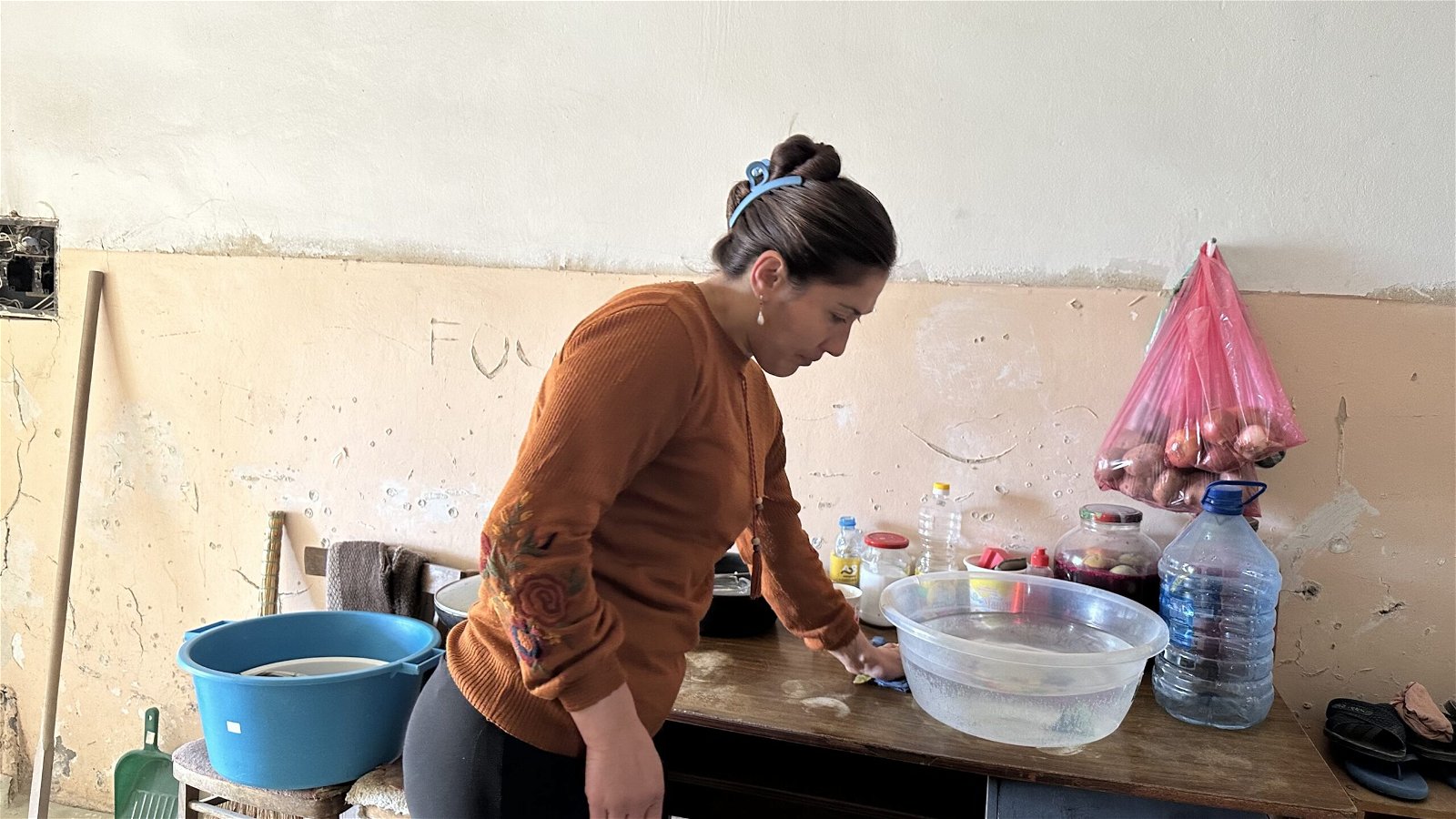
Harutyunyan hopes that, with continued support from benefactors, she can secure a refrigerator, dishes, household items, a television and computer for her two children, who are in school. “We all get together in the evenings and try to watch something on my daughter’s phone. It’s our only source of entertainment,” Harutyunyan said. Just like Ivan, Harutyunyan faces the challenges of making a home in the confines of a library, hoping for a brighter future with the kindness of those willing to help.
“Every time we start again from scratch,” began a conversation with 44-year-old Svetlana Mamunts, a mother of four children.
Mamunts’s family was forcibly displaced from the village of Aghabekalandj in the Martakert region of Artsakh. “When the explosions started, I was kneading dough. I left it unfinished, took my children and went into the basement,” Mamunts recalled.
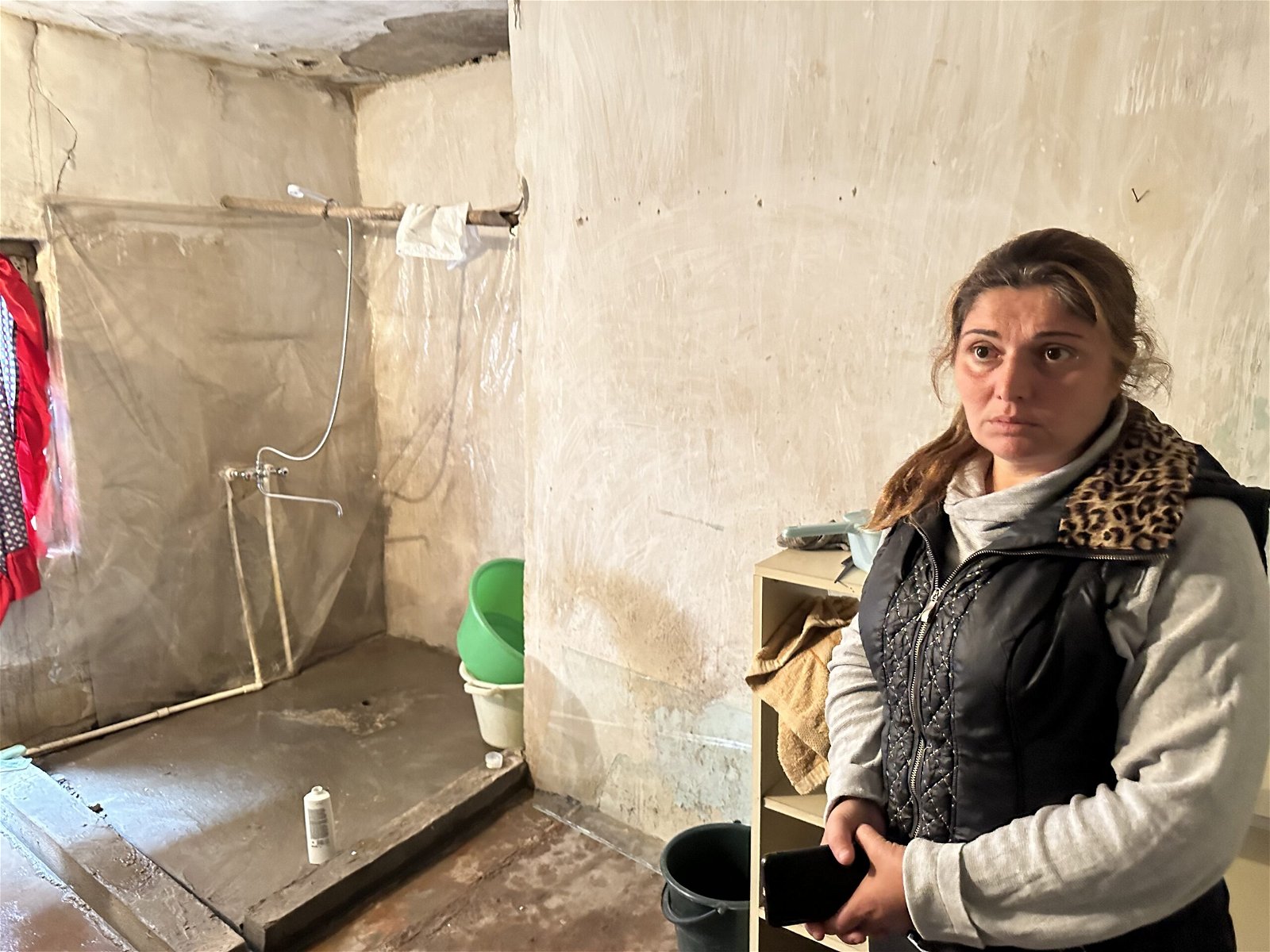
Mamunts and her family managed to escape and reach Stepanakert with a neighbor’s car. The Azerbaijani checkpoint that every car passed through while exiting Artsakh was particularly terrifying for Mamunts. “All those who had a man in their house went through that fear and mentally said goodbye to their relatives,” she said. They spent several days sleeping in cars, and after a three-day journey, they arrived in Armenia. The rented house they now occupy has almost nothing.
The family left behind two cars, and if they had fuel, they would have brought at least their household items with them. “But the most difficult thing is that we left our land, our house, our cattle,” Mamunts lamented. She regrets not bringing her sewing machine, which she used not only for herself but also to fulfill orders from villagers.
“Everyone wants to go back, but at what cost? If we have to live with Azerbaijanis, I will not dare to take my children there under any circumstances,” Mamunts shared.
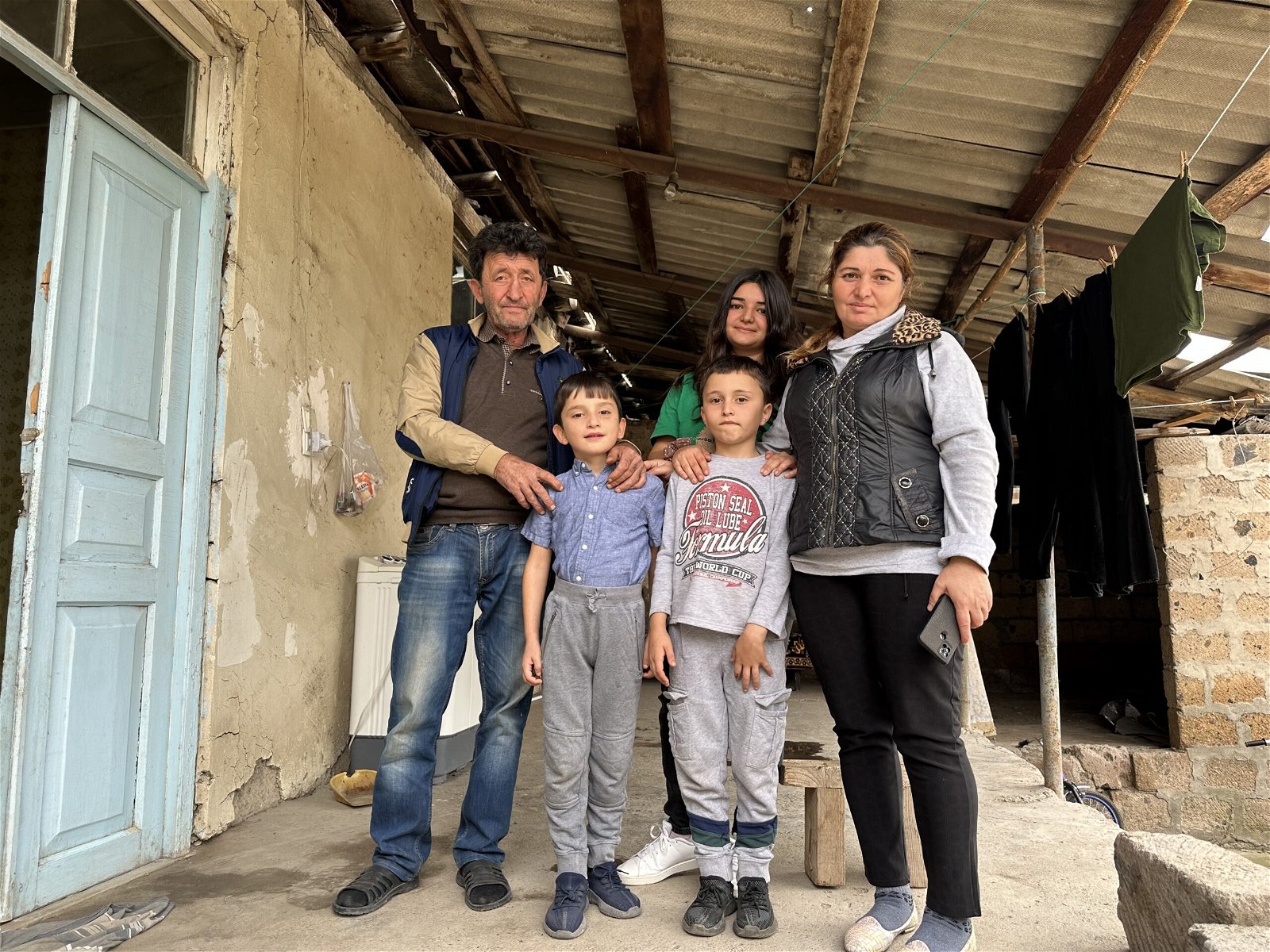
“It is the third time we have become refugees and lost our home, and we seem to have adapted to it, but for those who lost their home for the first time, it is very difficult. I try to calm them down,” said Ellada Harutyunyan.
When the Artsakh independence movement started in the 1980s, Harutyunyan lived with her family in Baku, Azerbaijan. During the Sumgait and Baku pogroms directed against Armenians, Azerbaijanis stabbed and killed Harutyunyan’s father. Her family arrived in Yerevan on December 7, 1988, the day of the devastating Armenian earthquake, then left for Artsakh.
Watch this interview with 60-year-old Elada, thrice displaced Baku Armenian. She had to flee anti-Armenian pogroms after her father was stabbed to death. The 2nd time was during the First Karabakh war & most recent she was ethnically cleansed along w/ 150K Artsakh Armenians. 1/2 pic.twitter.com/ja0zKUBXDe
— Siranush Sargsyan (@SiranushSargsy1) November 27, 2023
After the end of the first Artsakh War, her family settled in Aknaghbyur village in Artsakh. “As bees return to their nest, so we returned. The call of the motherland is inexplicable,” Harutyunyan said. With that call, after the 2020 Artsakh War, even though Aknaghbyur was occupied by Azerbaijanis, Harutyunyan’s family returned to Artsakh and lived in Stepanakert with rent. “If there is an opportunity, we will all return. It is our centuries-old homeland. We left our history and our sanctities there,” Harutyunyan said.
After Azerbaijan’s military assault on Artsakh in September 2023, it was difficult for the Harutyunyan family to make the decision to leave the homeland. Throughout the blockade, Harutyunyan’s husband guarded the border with other soldiers. Yet seeing that everyone was leaving, the family also took the path of migration.
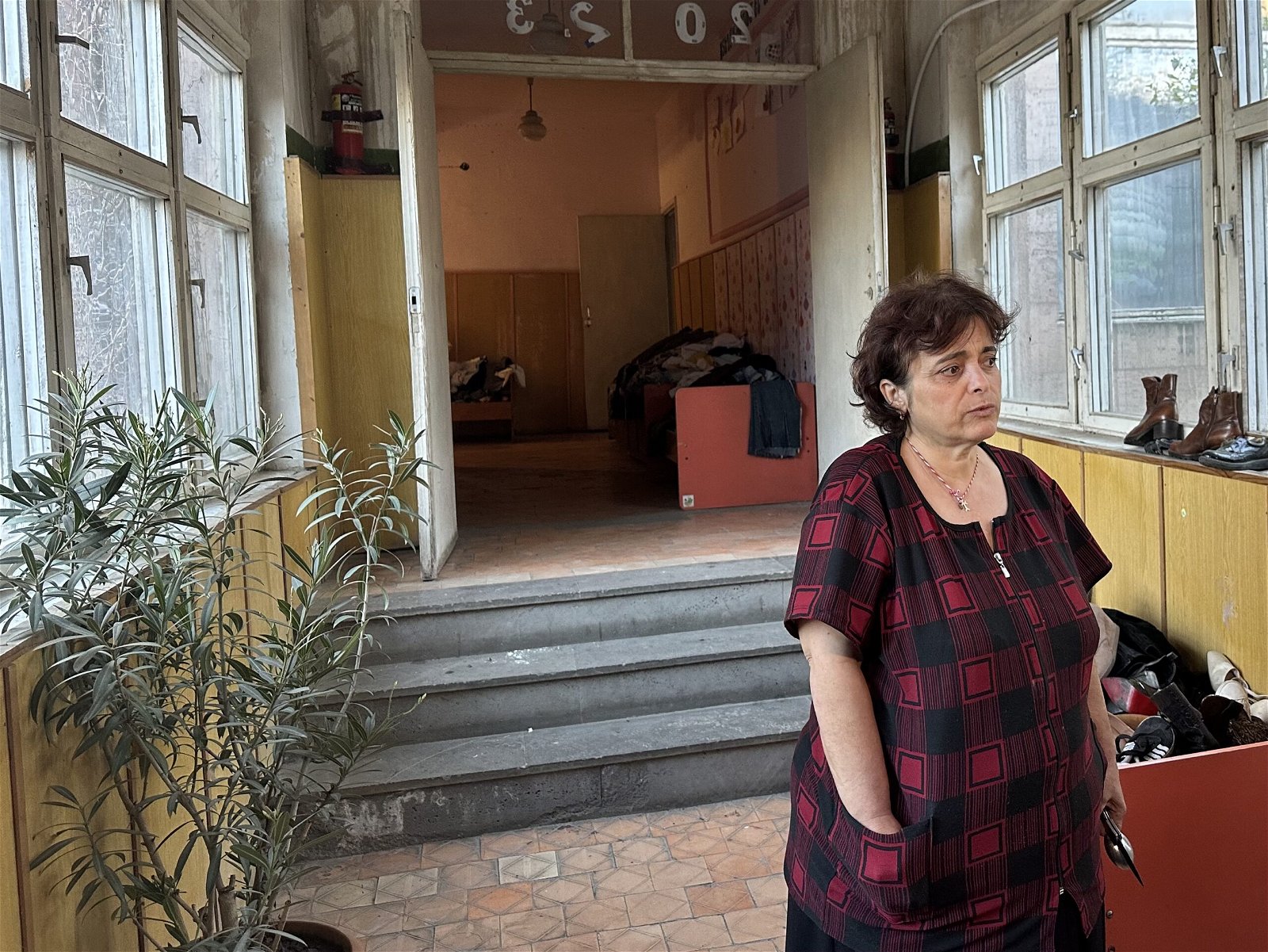
Harutyunyan finds it difficult to describe the two-day journey from Artsakh to Armenia. “People died on the road, and new ones were born. People were getting sick all the time,” she recalled.
“Even now, we seem to be waiting for something to happen. And you wonder, where are we going next? Is this ever going to end?”
Now Harutyunyan lives with her husband in the non-functioning Kindergarten No. 4 in Masis, Armenia. Another 67 displaced people from different villages of Artsakh live in the kindergarten building. There are no supplies or proper living conditions, but the families cannot afford to rent a house. “Even now, we seem to be waiting for something to happen. And you wonder, where are we going next? Is this ever going to end?” Harutyunyan posed.
Anahit Tamrazyan, a 37-year-old mother of six children, was displaced from Haterk village in the Martakert region of Artsakh. Her family worked in gardening and animal husbandry. Following Azerbaijan’s attack, they fled in a truck and drove to Armenia. “When we left the village, I managed to let the cattle go so that at least they wouldn’t die of hunger,” said Tamrazyan.
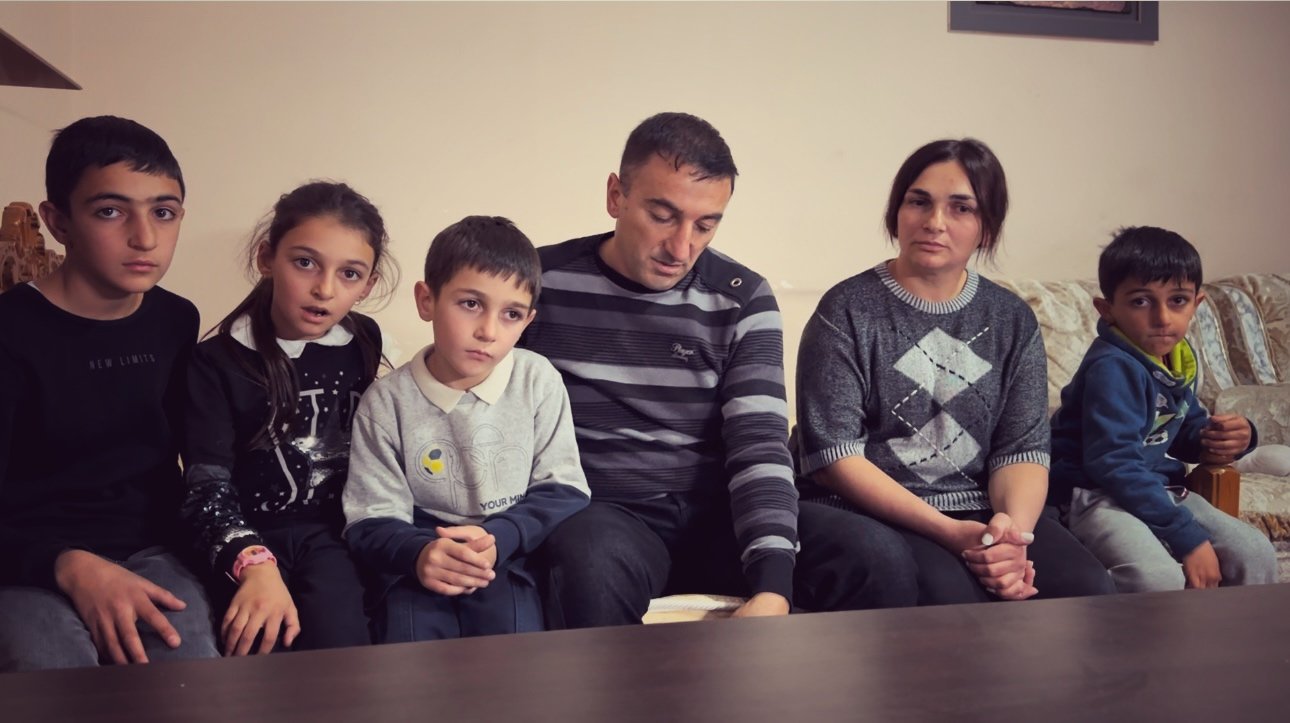
When the fighting started, Tamrazyan’s eight-year-old son Davit initially thought he was hearing the sounds of construction, but he quickly composed himself and ran to the basement. He misses his friends, who he last saw during the deportation, but he could not approach them to say goodbye. Davit dreams of becoming an artist, but in his letter to Santa Claus, he asked for a toy weapon. “To return to our village and protect the village,” he explained.
“Although we were close to the border and it was dangerous, we were home. All my children find it very difficult to adapt here,” Tamrazyan said. Despite the difficulties of the blockade, Davit believes life is better in their village in Artsakh. He hopes to return to see his friends, Hansel and David.
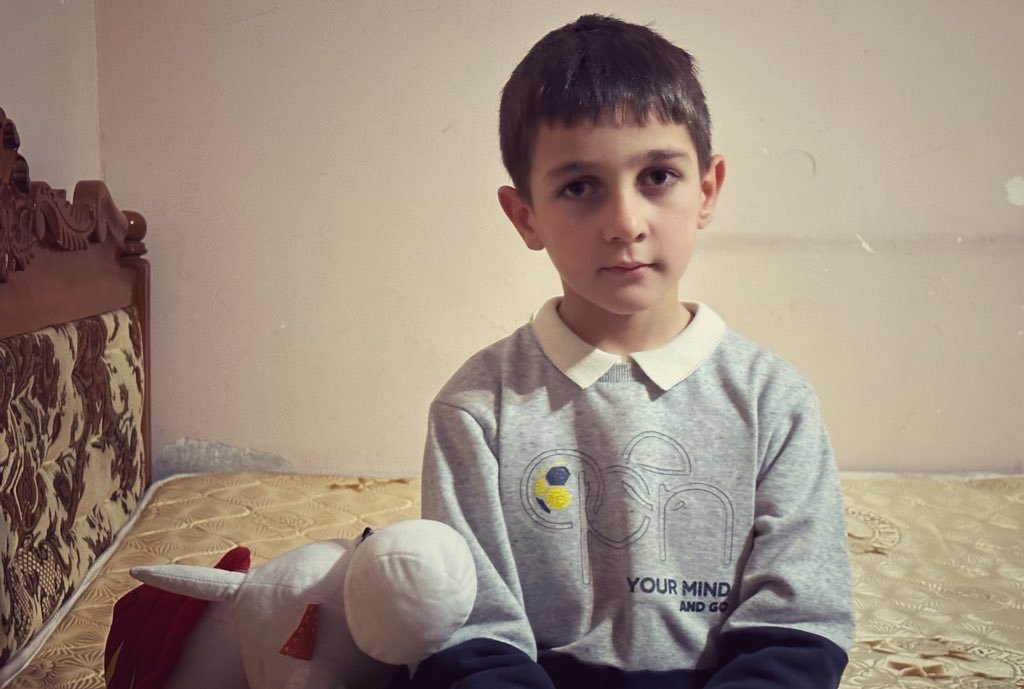



Based on Artsakh President Shahramanyan there is no legal decree that will dissolve the Artsakh Republic and their institutions will continue to work in exile. Besides the Republic of Artsakh was formed by their people’s votes based on legal procedures and can’t be dissolved by the president … These stories of Artsakh refugees are the best evidence of Artsakh Armenian’s right to safely return to their homeland…
Why does Pashinyan refuse to give Armenian citizenship to the Artsakhi refugees? Is it because he is afraid that it would mean additional voters who would vote him out of office, because Artsakh was destroyed and lost under his watch?
Armenians chose nikol over Artsakh…
Armenians chose vague promises from the west over Artsakh.
Good job Armenians!!!
Arktash was becoming more in jeopardy prior to Pashinyan the limited losses in 2016 were not taken seriously enough. Apart from the meaningless recognition from Ossetia, Abkhazia and Transdinestra, Arktash had no recognition from any nation hardly the sign of a successful cause even if on the ground life was ordinary enough. Russia wanted Armenia to withdraw from the entire area in order to befriend Azerbaijan. Arktash was among Tamil Elam and Biafra in being a failed secession. Russia never really liked the Armenian self determination cause partly because it was one of many reasons for the failure of the Soviet Union, possible implications for itself, hence why Armenia never even recognised Arktash as independent due to Russian pressure, in the west there was general indifference to the cause. Russia never supported Arktash as Europe and USA supported the Albanian Kosovo secession cause yet incredibly many Armenians viewed Russia as though it did!
@Charles
Terrorist Turkey invaded and occupied Greek Northern Cyprus in 1974 and after fifty years to this day no country other than terrorist Turkey itself has recognized Northern Cyprus as Turkish. Not even the pseudo-Turkish artificial Azerbaijan republic the criminal collaborator of terrorist Turkey. Makes you wonder what happened to their hollow statements of “two states, one nation” which is nothing more than a euphemism for the destruction of the Armenian nationhood. That makes your related point about Artsakh not having any recognition from any nation moot. Nevermind dysfunctional, incompetent, treasonous and unpatriotic sorry excuse of a leader Pashinyan and his government for their failures but the real reason Armenia avoided recognizing Artsakh republic, not that Armenia did not recognize it so because it did do that unofficially, was a strategic move to avoid conflict with the enemy while working towards the legitimization of the republic by the international community based on people’s will and right to self-determination. The enemy for its turn, was fooling the world acting as peace seeker by attending make-believe peace negotiations because it never had any intention of establishing peace but rather it was buying time to get ready for war. The enemy only portrayed itself as peace seeker because at the time it was not ready to start a war. The Armenian leaders were short-sighted in 1994 with their victory and failed to bring their victory to its intended conclusion when the enemy was defeated and was at its weakest and completely helpless and defenseless. That is when our problems began. When you give your enemy room to breath without first reaching your ultimate goal, the full liberation of Artsakh and surrounding regions and their international legitimization and integration with Armenia, the enemy will use that opportunity to get stronger and surprise you when you least expect it. This was an enemy that had to be decapitated once and for all to achieve our goals and I’m quite surprised our former leaders did not recognize this fact at the time and more so given the fact that they had existed under their illegal occupation and racist treatments for decades and were quite familiar with their unscrupulous character.
Thank you for your dedication to reporting on the displacement. Your reporting gives insight and understanding to those of us in the diaspora that is invaluable.
Thank you for your feedbacks
@ Ararat I am aware of Turkey invasion of Cyprus in 1974 and the ousting of the Greek population and transplantation of mainlanders to create facts on the ground. I am also aware that only Turkey recognises the independence of North Cyprus and hence it’s international political and economic isolation. Thus whilst Cyprus by itself isn’t strong enough to challenge Turkey on the issue and farcical UN led negotiations continue. As for the one nation two states rhetoric mainly from Turkey obviously the primary target is Armenia. It should be noted that Turkey was an enthusiastic supporter of the Kosovo Albanian cause having once been it’s colonial master whilst Azerbaijan doesn’t recognise Kosovo officially. In turn it’s worth noting the rhetoric from Turkey towards Israel even if it’s a charade to some extent there is no doubt their relationship is no longer in the honeymoon state. Such statements against Israel from Azerbaijan currently would be unthinkable so hence whilst Turkey and Azerbaijan have much in common there is much they don’t.
Nevertheless it was impossible to expect any international recognition of Arktash when Armenia for various reasons didn’t itself, no state entity can function with regard to others if no one recognises it. Also in 1994 Armenia only secured a ceasefire on favourable terms the conflict was essentially ignored by the international community contrast with the contemporaneous Bosnian wars UN this UN that ceasefires forced on the belligerents interference by NATO. Hence to the wider world Armenia was occupying much of Azerbaijan but by and large didn’t much care no UN peacekeeping supervision for example. Thus Armenian victory in 1994 was not to be compared even to the defeat of Germany in 1918 much that many Armenians seemed to imagine it as such. Personally I feel it’s the privileged nations sanctification of their hegemony by stating that boundaries can’t be changed and amounts to ossification and schlerotic ways and arbitrary tyranny even it is nominally to keep the peace, however that is an opinion and have no authority about such matters although there are signs that these protocols are coming under unprecedented pressure although the natural response of the powers to be is to double down in the face of challenges. It’s possible that Turkey would have intervened in 1994 and probable the UN would have sanctioned Armenia had it persisted in its advances after all big countries write the rules small countries must obey them. It’s a done deed but Azerbaijan was nominally prepared to accept some form of effective independence for the parts of Soviet N-K under Armenian and Armenian control of a corridor with Armenia and the parts Azerbaijan outside Soviet N-K controlled by Armenia to be returned to Azerbaijan and the Soviet era exclaves in Azerbaijan and Armenia to be dissolved formally exchanged. However a mixture of fear, distrust, obsinance and Russian meddling (to keep the conflict festering and a role for itself as go between) and Azeri playing the long game knowing that it rightly or wrongly international law and protocols on its side meant that such proposals which been provisionally agreed were never implemented. The issue of limited Russian support for the Armenian cause in strong contrast to the overt and deep support the USA has for Israel and Kosovo wasn’t addressed in your response. Although I am aware of your sceptical view of Russia the infatuating reverence displayed by @Concerned Armenian and @ Gurgen in this regard is a troubling malaise borne by far too many Armenians in my opinion by the unresolved past animosities and sense of desperation and vulnerability regarding Turkey and Azerbaijan, of which the seemingly irritractable issue has been something that Russia has taken for granted in regards to its policy with Armenia. Recent events such as the friendly relationship Russia has with Turkey and Azerbaijan and it’s less than stellar military campaign in Ukraine, the unchallenged blockade and subsequent storming of Arktash have changed this assumption to some extent. Also many Armenians thought that Russia with its supported causes in Ukraine and Georgia would on this basis support the Armenian position and the Russian foreign minister Sergei Lavarov being half Armenian would support Armenia on the basis of identity politics but this is not the case. As for Pashinyan he couldn’t have taken office in 2018 if there wasn’t internal political, economic, social issues that the foreign situation with Turkey and Azerbaijan couldn’t serve as a unifier over. Israel has found itself in a similar situation where the Holocaust memory and the contentions with Palestinian population and it’s neighbours was no longer able to knock heads over internal Jewish issues and unite as in previous years. The relative rise of Azerbaijan was something that had been ongoing for years and the war in 2016 failed to serve as sufficient warning of partly because the territorial losses were superficial, for the talk of Pashinyan dismissal of the clique from that era in those days guided drones were almost non existent technology had changed the dynamic greatly hence what was appropriate skills then wasn’t necessarily so anymore. Sadly Yerevan’s attempts to gain international recognition for Arktash independence were either inept or an insurmountable proposition this being clear 1994 – 2018